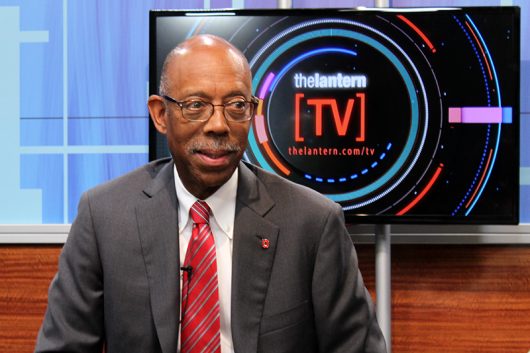
Republican presidential candidate Donald Trump speaks during a rally at the John Glenn Columbus International Airport on March 1. Credit: Lantern File Photo
The Department of Homeland Security announced Thursday it will preserve an Obama-era policy meant to protect undocumented immigrants brought to the United States as children, ending months of uncertainty over the fate of a program President Trump vowed to rescind during the campaign.
The Deferred Action for Childhood Arrivals program, better known as DACA, has granted an estimated 750,000 immigrants “work permits or deportation relief,” according to the Pew Research Center, since its creation in June 2012.
The official decision from DHS to maintain DACA, which came on the fifth anniversary of its rollout, is significant because it offers legal clarity to those protected under it. During the campaign, Trump promised to “immediately terminate” former President Barack Obama’s cornerstone immigration policy, but later said in February he planned to “deal with DACA with heart.”
Like many colleges across the country, Ohio State has students protected under the program, though the university said it isn’t aware of an exact figure. University President Michael Drake applauded the decision in a statement to The Lantern.
This is welcome news, and we will continue to monitor this important issue,” he said. “DACA students bring great strength to our learning environment by bringing together outstanding students from a wide variety of backgrounds to join and build our community.
“DACA students have overcome barriers, often against the odds, have been admitted to our competitive, highly selective institution, and they contribute greatly to our success.”
Drake has been an outspoken supporter of DACA since it came under scrutiny during the presidential campaign.
In November, Drake, along with more than 600 university presidents across the country, signed a letter urging the incoming Trump administration to continue supporting the program.

University President Michael Drake speaks to The Lantern on Sept. 12. Credit: Lantern file photo
“We are prepared to meet with you to present our case. This is both a moral imperative and a national necessity,” the letter said. “America needs talent – and these students, who have been raised and educated in the United States, are already part of our national community.”
In an interview with The Lantern in January, Drake again offered support of the program, highlighting “the incredible journey” students protected under DACA have taken to attend college.
“(Multiple university presidents) work together to determine how policy, federal policy, national policy, can affect things that are important to us,” Drake said. “This pathway to being contributors broadly in our society is one we want to enhance and not do anything to impede in any way.”
At the same time DHS offered its commitment to DACA, it announced it was no longer defending in court another Obama-era immigration policy.
The Deferred Action for Parents of Americans and Lawful Permanent Residents program, which also expanded the number of DACA-eligible individuals, was designed to provide work authorization and deportation relief to undocumented parents of U.S. citizens and permanent residents. Announced by Obama in late 2014, DAPA had never been implemented after being blocked by federal courts.
The Supreme Court reviewed the order in January 2016, but split 4-4, leaving in place the decisions from the district court and the Fifth Circuit until further litigation was resolved.
The decision to leave in place DACA and terminate DAPA came after DHS Secretary John Kelly weighed a variety of factors, according to a FAQ sheet posted by DHS, “including the nationwide injunction of the DAPA memorandum, the ongoing litigation, the fact that DAPA never took effect, and our new immigration enforcement priorities.”
Frederic Aldama, a professor in the Department of English who has long publicly defended DACA, said he was initially glad to see the program preserved, but his second reaction was “it doesn’t mean we’ve solved the problem.”
Aldama expressed concern over the Trump administration’s malleable approach to the issue in the past, which he said leads to skepticism about whether DACA will remain intact in the longterm.
“Yes, today I’m happy, and I know many people are happy from the community, I know many students that are happy, I know many high-school students that I interact with on a daily basis are relieved, but that’s today,” Aldama said. “God knows what’s going to happen tomorrow.”


